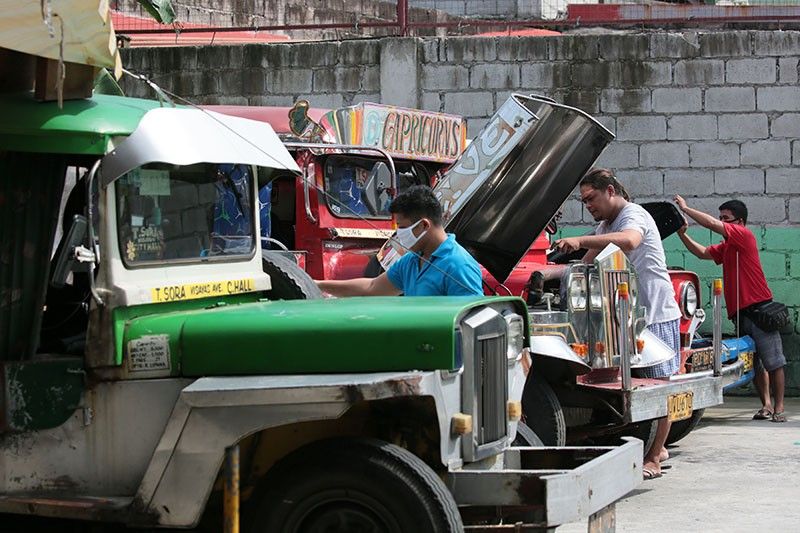Lack of PUVs in Metro Manila alarms House panel

MANILA, Philippines — A Modified Enhanced Community Quarantine was implemented to give frontliners in Metro Manila and nearby provinces a "time-out" during the monthslong pandemic, though their struggles have only multiplied by a lack of public utility vehicles for commuters who still need to go to work.
At Wednesday afternoon's meeting of the House Committee on Metro Manila Development, lawmakers asked the Department of Transportation to allow more PUVs to operate.
Rep. Manuel Luis Lopez (1st District, Manila), who chairs the committee, said that the number of PUVs operating in Metro Manila is "way too low," acknowledging the calls of health workers that the severe lack of transportation options has contributed to rising cases of COVID-19.
Rep. Edgar Erice (Caloocan) added: "What we don't want to happen on August 19 when we go back to [general community quarantine] is for workers to still have to walk to get to the office, without public transport."
Transportation Secretary Arthur Tugade defended the limited transportation options, saying it is what the government's coronavirus task force ordered. The measure is believed to minimize the spread of the coronavirus.
RELATED: Palace stands by restrictions on public transportation
Tugade also pointed out that the department had already doubled the government subsidy offered to operators participating in its contentious jeepney modernization program from to P160,000 per unit from P80,000. Transportation sector advocates say that the amount still falls short of what is needed for jepeney operators to be able to afford new units.
READ: Subsidy doubled to retire old jeepneys, but assistance still insufficient
More routes planned, but where are the jeepneys?
In a manifesto calling for the re-imposition of ECQ to give healthcare workers a "time-out," the Philippine College of Physicians also said: "This problem cannot be addressed by long-term infrastructure."
"We need prompt and rapid solutions with long-term impact such as the immediate implementation of service contracting, pop-up bicycle lanes, and pedestrian lanes. Workers need more transportation options to prevent congestion in public streets. We need these now, not next year, because people need to get to work but have no safe transport options," it also said.
Health chief Francisco Duque backed the construction of bicycle lanes, though none of these suggestions were mentioned at the hearing.
House Minority Leader Benny Abante (Manila, 6th District), who was also present at the meeting, disclosed that the National Task Force against COVID-19 endorsed the committee's request to increase all modes of public transport to at least 30% and by at leats 10% after every week.
For his part, Martin Delgra, chairman of the Land Transportation Franchising and Regulatory Board said: "We have received instructions from IATF to increase the number of units."
"The basic strategy that we have is that we're going to be opening up bunches of routes every week, and that is what we're going to submit on Friday. We've actually started it three weeks ago, releasing new routes covering hundreds if not thousands of units. So we will continue to do that so that we will continue to meet the target," he also said.
The modified enhanced community quarantine, though, is only slated to last for two weeks until August 18. For that entire duration, only public shuttles for frontliners, company shuttles, and active transport will be allowed.
While the Department of Transportation insists on pushing through with its planned infrastructure projects, saying "if not now, then when?" civil society groups like the Move as One transportation coalition highlight that transportation is a public health issue and called for a service contracting scheme, which is echoed by the doctors.
Under service contracts, operators are paid to ply routes regardless of how many passengers get on. The contract is meant to compensate them for operating while fewer commuters are allowed out.
Private sector urged: Hire PUVs as shuttle services
In a separate statement issued on Tuesday, the department also appealed to employers to lease public vehicles, including traditional jeepneys, to help transport workers in the absence of public transportation.
READ: Nearly a month into GCQ, gov't uncertain on jeepney's fate
"We encourage private companies to hire or lease public vehicles, such as buses, UV Express, and modern or traditional jeepneys that cannot travel today at MECQ, to be the shuttle service of their respective employees," the DOTr said in Filipino.
"The driver only needs to present a certificate/authorization letter or letter of intent from the company, stating the specific route, as proof that the public transport is used as a shuttle service," it said.
Despite the pronounced transportation woes during the general community quarantine, the Inter-Agency Council for Traffic, which includes the Land Transportation Office, LTFRB and MMDA, impounded shuttles found without the necessary documents.
READ: Shuttles for workers impounded for 'lack of contract' amid transportation shortage
Task force: 'Back-riding' an essential mode of transport
According to Police Lt. Gen. Guillermo Eleazar, commander of the Joint Task Force COVID Shield, any medical frontline or essential worker may now ride pillion, a decision that the coronavirus task force expects will "address the transportation concerns of people who would be allowed to go out and work."
“Since public transportation is not allowed in Metro Manila and the four provinces under MECQ from August 4 to August 18, motorcycle back-riding will be an essential mode of transportation to ensure that no frontliners and other essential workers would be stranded as they go out to report to work and on their way back home,” said Eleazar.
The police lieutenant general also highlighted that even unauthorized riders are allowed to transport workers and frontliners as long as they do not do so for a fee.
Only around 30% of households in Metro Manila own any form of motor vehicle, the 2019 Q3 survey by the Social Weather Stations suggests.
According to data from the Japan International Cooperation Agency, only 12% of households in the country have cars, while the remaining 88% relies on public transportation.
- Latest
- Trending































